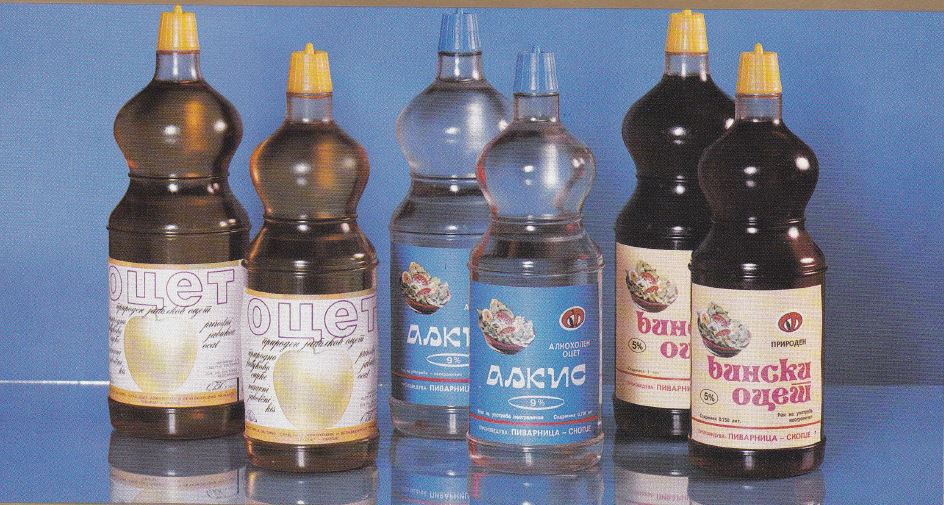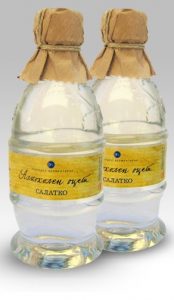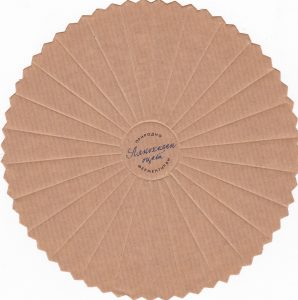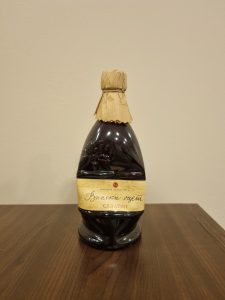
THE VINEGAR “SALATKO” – REMINDER OF THE MACEDONIAN TRADITION
Poured by:
Vasilka Dimitrovska, M.Sc
Alexander Madzovski
HAEMUS – Center for scientific research and promotion of culture
The end of the 70s is one of the turning points in the history of Pivara Skopje. The merger with “Biserka” brought an increase in the brewery’s production capacity, primarily in terms of quality staff and experts for non-alcoholic products. That’s when the construction of a new plant started in the vicinity of the factory, popularly called “Ocetara”. In 1982, the range of Pivara Skopje included vinegar, which soon began to win numerous international awards and recognitions for its top quality. The company procured apple cider vinegar in the form of a concentrate from Resen. When the vinegar fermented and acetic acid was formed from it, the factory reduced it to 3-5% edible vinegar. There was a cistern in which the vinegar was filtered and properly prepared, and the whole procedure was done by hand. The process was very sensitive, because the microorganisms that ferment it are quite sensitive if there is no air. Knowing this, the brewery had also prepared aggregates for that purpose, in case the process fails. At the beginning, this vinegar was mostly distributed in tanks, mostly to Serbia, as well as for the needs of peppers’ factories in Negotino, Gevgelija, Strumica and other places. Since the need for vinegar at that time was quite high, the factory hired seasonal workers who filled the vinegar in 1l, 3l, 5l bottles, put a label and filled the pallets. At the very beginning, the brewery produced three types of vinegar: alcoholic, wine and apple, and all of them were first-class, with an infinite shelf life. The vinegar produced by Pivara Skopje was the only vinegar in our country that was produced by natural fermentation, without essences and additives, and the buyers knew and appreciated it very well.
A little later the vinegar will be rebranded under the popular name “Salatko”, keeping its high quality, but this time packaged in more attractive packaging . The bottles were closed using paper, wax and thread, which contributed to an “antique” and “homely” look. There is also one interesting piece of information in the company’s production bulletins. “Martinka” thread is included in the lists of repromaterials used. During a conversation with now retired people from Pivara Skopje, as well as with other older people, it was confirmed that the thread was used to attach the labels to the plastic balloons in which the vinegar was poured, and it was red and white, the same as the color of the threads from which “martinka” was made, an old custom that spread over a large part of the Balkan peninsula, that apart from our country, includes Romania, Bulgaria, as well as parts of Serbia, Albania and Greece. The curiosity is all the more interesting if you take into account that until the sixties-seventies the custom in our country was almost completely forgotten, but here is the characteristic thread, which after some random, and maybe not so random coincidence, will be found on a product that tends to evoke the tradition and warmth of home. Later, the “martinka” thread will be replaced by hemp thread, and the packaging will also change.
When in 1998 Pivara Skopje became part of the global family of Coca – Cola Hellenic and HEINEKEN, the company’s technical capacity reaches an incredible 60,000 hl. of “Salatko” vinegar. Due to the top quality of the products, for its wine, alcohol and apple vinegar, Pivara Skopje will receive worldwide recognition for decades from the International Institute for Quality Selection “Monde Selection”. Sometime after 2005, Pivara Skopje makes a decision to no longer produce vinegar and similar products and they will be withdrawn from the market. The plant of the old “Ocetara” will be demolished and thus the space of about 1600 m2 will stay for a construction of a new facility. In the place where “Ocetarata” was once located, today there is a state-of-the-art waste water biotreatment station in our country, one of the few of this type, a project that all Pivarci are proud of. Those who remember the quality and especially the tactile experience of “Salatko” vinegar, are deeply convinced that the company only temporarily stopped its production. Maybe one day “Salatko” will find its place on the home table again. Until then, let each next “zimnica” making be just one more step in preserving our tradition and heritage.
The text is adapted and reworked from the original scientific research project of HAEMUS entitled “Study on the history of Parnata Pivara Skopje”, commissioned and supported by Pivara Skopje.
Photo: Archives of Pivara Skopje, private collectors
Archival sources: NUB “St. Kliment Ohridski” – Skopje, DARMS – department Skopje (Archive of the City of Skopje), Archive of the Skopje Brewery













